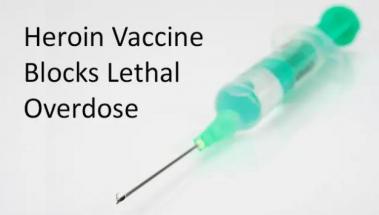SYRACUSE, N.Y. – Upstate Medical University is part of a research project developing a vaccine to prevent heroin users from getting addicted to and high on the illegal drug.
Researchers at Upstate and the Walter Reed Army Institute of Research in Maryland have received a $3.7 million grant to conduct clinical trials on an experimental heroin vaccine.
The vaccine was developed by researchers in Walter Reed’s Military HIV Research Program and the National Institute on Drug Abuse. In preclinical studies, the vaccine produced antibodies that stopped heroin from entering the brains of mice and rats for up to three months.
If the experimental vaccine is approved by the FDA it will be tested on human volunteers at Upstate beginning in late 2020.
Other research groups also are working on developing heroin vaccines. The Scripps Research Institute in California announced last year its vaccine is almost ready for human testing. Minneapolis Medical Research Foundation also is developing one. Using vaccines to combat addiction got a lot of attention in 2017 when Tom Price, President Trump’s former U.S. health and human services secretary, touted them in a news conference.
The abuse of heroin and other opioid drugs is a national epidemic that caused more than 72,000 overdose deaths in 2017.
Dr. Stephen Thomas will oversee a clinical trial of an experimental heroin vaccine at Upstate Medical University.
Dr. Stephen Thomas, who will oversee the clinical trial at Upstate, said the goal of the research is to come up with another tool to fight the epidemic.
“If I have 100 people who have a heroin abuse disorder and this vaccine helps 10 of them go into sustained recovery that is a huge impact,” he said. “That has saved 10 lives.”
Thomas is an infectious disease specialist. Before joining Upstate in 2016 he worked at the Walter Reed Army Institute of Research and was familiar with the heroin vaccine research.
After arriving in Syracuse Thomas was shocked by the number of patients he saw with serious and sometimes fatal infectious diseases caused by injecting heroin. That prompted him to call researchers at Walter Reed and tell them Upstate wanted to get involved in the heroin vaccine research.
Later this year Upstate expects to submit an application to the FDA seeking permission to test the vaccine in 30 to 100 human volunteers. Upstate has not figured out yet what type of volunteers it will recruit for the study. Thomas said researchers must first analyze the risks and benefits of testing it in people without histories of substance abuse, people recovering from addiction and people still using heroin.
The heroin vaccine alone probably won’t be successful in treating addiction unless it’s used as in conjunction with counseling and other services, Thomas said.






